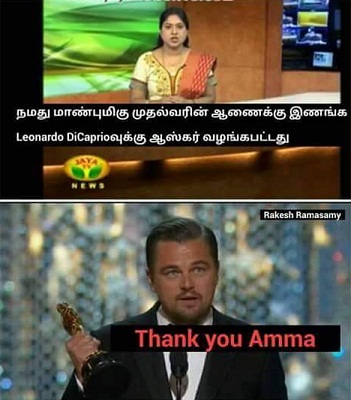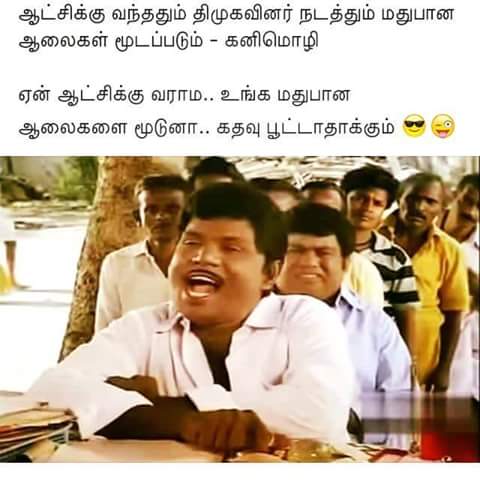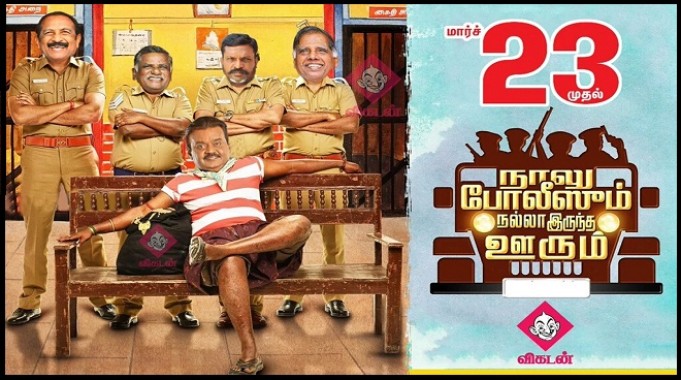Voters strike back at TN’s captive political media
The DMDK's Vijayakanth does not escape the satirist's attention. (Picture circulating on social media)
Caught between the devil and the deep blue sea – between Tamil TV channels aligned to political parties and Tamil print media wary of criticizing outgoing Tamil Nadu chief minister and AIADMK chief J. Jayalalithaa – ordinary citizens in this southern Indian state are striking back with spoofs and memes that strike at the heart of its politically despotic order.
As Tamil Nadu goes to the polls on May 16, these ordinary citizens have used laughter as a weapon to at least partially demolish the halo that surrounds the leaders of the state’s main political parties – besides Jayalalithaa, MK Karunanidhi of the DMK and Vijayakanth of the DMDK, who has created a Third Front called the People’s Welfare Front in the hope that it will drive a wedge in the votes commandeered by this two-party state.
If irony is the message and laughter its outcome, then Whatsapp and Facebook and other forms of social media – which the state cannot control – are the medium. Consider the following :
The newsreader is making an announcement : “On the orders of our Hon'ble Chief Minister, Amma, the Oscar has been awarded to Leonardo di Caprio,” she says. Which is when the story cuts to Di Caprio who says, "This is for Amma!"

And in the picture below, the famous Tamil comedian Goundamani is making fun of a comment by DMK leader and daughter of Karunanidhi, Kanimozhi, who says, “All liquor factories run by DMK leaders will be closed down when we come to power.” She is talking about her party’s plan to impose prohibition in Tamil Nadu if it wins.
To which Goundamani responds : “If you shut them down, wont the people shut their doors on you?”

Nor does the DMDK’s Vijayakanth escape attention. In a spoof on him (picture at the beginning of this article), the ageing film actor is seen with four cops standing behind him, like in a movie poster. Evidently, the movie is about the havoc the cops cause in a village, presumably imitating real life.
Confronted with politically aligned news, especially on TV, it’s as if the people have been forced to look for the critical middle ground. Party-owned TV channels in Tamil Nadu don’t even pretend to put out news that is supposed to be objective.
Everyone knows that if you watch Jaya TV, owned by Jayalalithaa, then the news will be slanted in the direction of the AIADMK. If you’re watching Sun TV (name taken from the rising sun symbol of the DMK) or Kalaignar TV (named after what DMK patriarch Karunanidhi is respectfully called), then you will get pro-DMK news.
Captain TV, which belongs to DMDK’s Vijaykanth (who leads the PWF coalition), will give you stories slanted in his and the coalition’s favour. Anbumani Ramadoss, who leads a smallish party called the Pattali Makkal Katchi (PMK) has its own channel, Makkal TV. While Thol Thirumavalavan, who heads the pro-Dalit VCK party (which is also part of the PWF), launched a pro-Dalit channel, Velicham TV, on April 14, the birth anniversary of B R Ambedkar.
Even the BJP, which is unlikely to get even one seat out of 234 in Tamil Nadu’s state assembly, has its own channel, Lotus TV. Congress leader Vasantha Kumar doesn’t want to be left behind with the news, no matter the Congress is expected to get only 4-5 seats in this election. He owns Mega TV.
Certainly, over the last five years, Jayalalithaa left nothing to chance. A single woman who fought her way to the top in a dog-eat-dog political world, the outgoing chief minister became increasingly insecure about public criticism. She realized how increasingly influential – even, powerful – the media was becoming. She needed the press to fall in line.
So Jayalalithaa decided to employ the carrot-and-stick approach. She used the government-owned publicity department to control expensive newspaper advertisements, allegedly not only to Tamil newspapers like Daily Thanthi (Dina Thanthi in Tamil, the largest selling vernacular paper in the state) and ‘Dinamalar’ but also, according to Chennai gossip, the venerable Hindu newspaper and the New Indian Express.
Seems The Hindu had reproduced an article from the Tamil Nakkeeran newspaper in 2012, which had called Jayalalithaa a “beef-eater.” Jayalalithaa not only slapped a defamation case against Nakkeeran but also against the Hindu, saying the English paper could not hide behind the excuse that the story was simply a reproduction.
It is no secret that government advertisements are a source of much-needed cash for newsmedia, which governments cleverly use in the application of political pressure.
Jyoti Malhotra is a senior journalist based in New Delhi







